
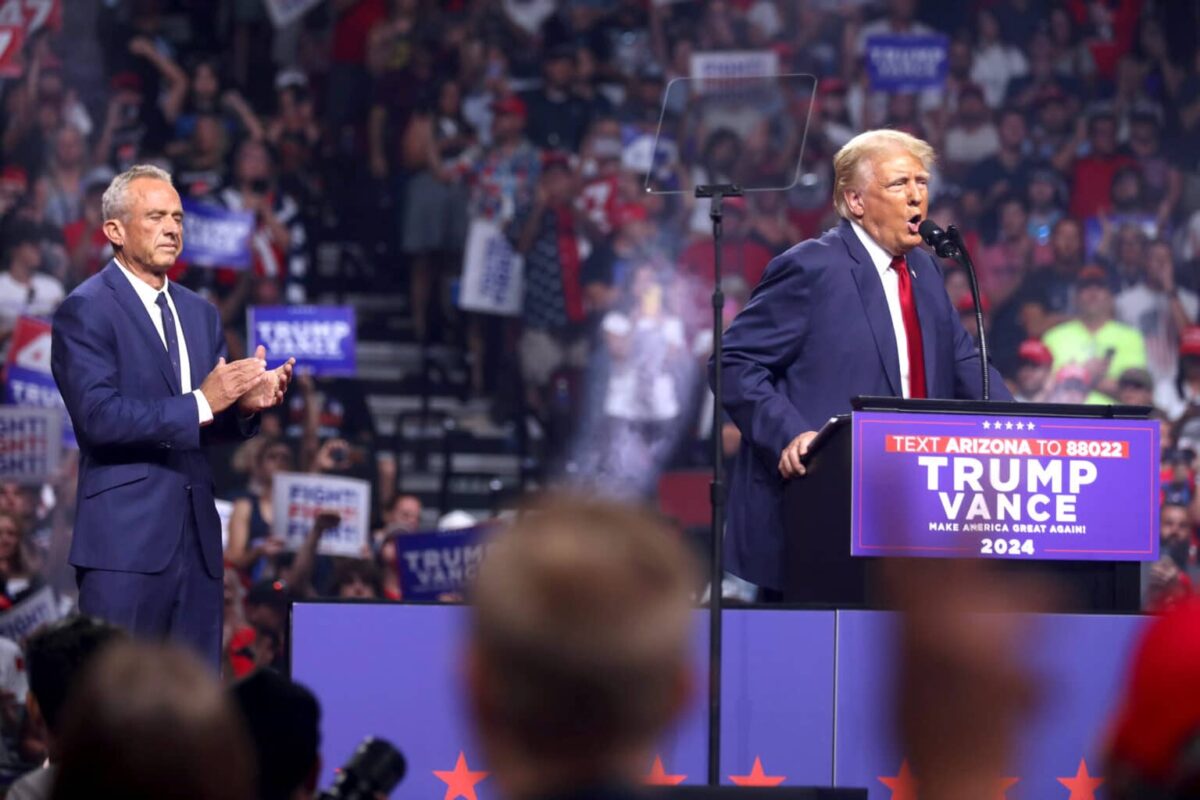
‘Russian Interference’ 3.0
by John Kiriakou | Sep 17, 2024
The Office of the Director of National Intelligence (DNI) said last week that the Russian government was using “more sophisticated propaganda” to influence the 2024 election than it has used in previous election cycles.
The Russians, the U.S. intelligence community alleges, are “using authentic U.S. voices” to “launder” Russian government propaganda and to spread socially divisive narratives on social media platforms and fake websites.
The DNI concluded that the Russian action “was consistent with Moscow’s broader foreign policy goals of weakening the United States and undermining Washington’s support for Ukraine.”
It should be so simple.
In the meantime, the Department of Justice has indicted two Russians who live in Moscow on charges of conspiring to violate the Foreign Agents Registration Act (FARA) and conspiring to launder money.
I’d like to break this down. But first, let’s look at Russia’s “sinister” actions in the 2016 and 2020 elections.
2016 – Mueller Report
I won’t beat the Mueller Report to death, but the bottom line was that there was no meaningful Russian interference in the 2016 election. Would the Russians have liked to play a role and to help get Donald Trump elected? Probably. But they didn’t.
Hillary Clinton lost that election all on her own. And she was probably the only person in America who couldn’t have beaten Donald Trump that year. There were certainly a lot of allegations of Russian interference in the 2016 election, but neither Mueller and his team, nor congressional investigators found anything worth acting against.
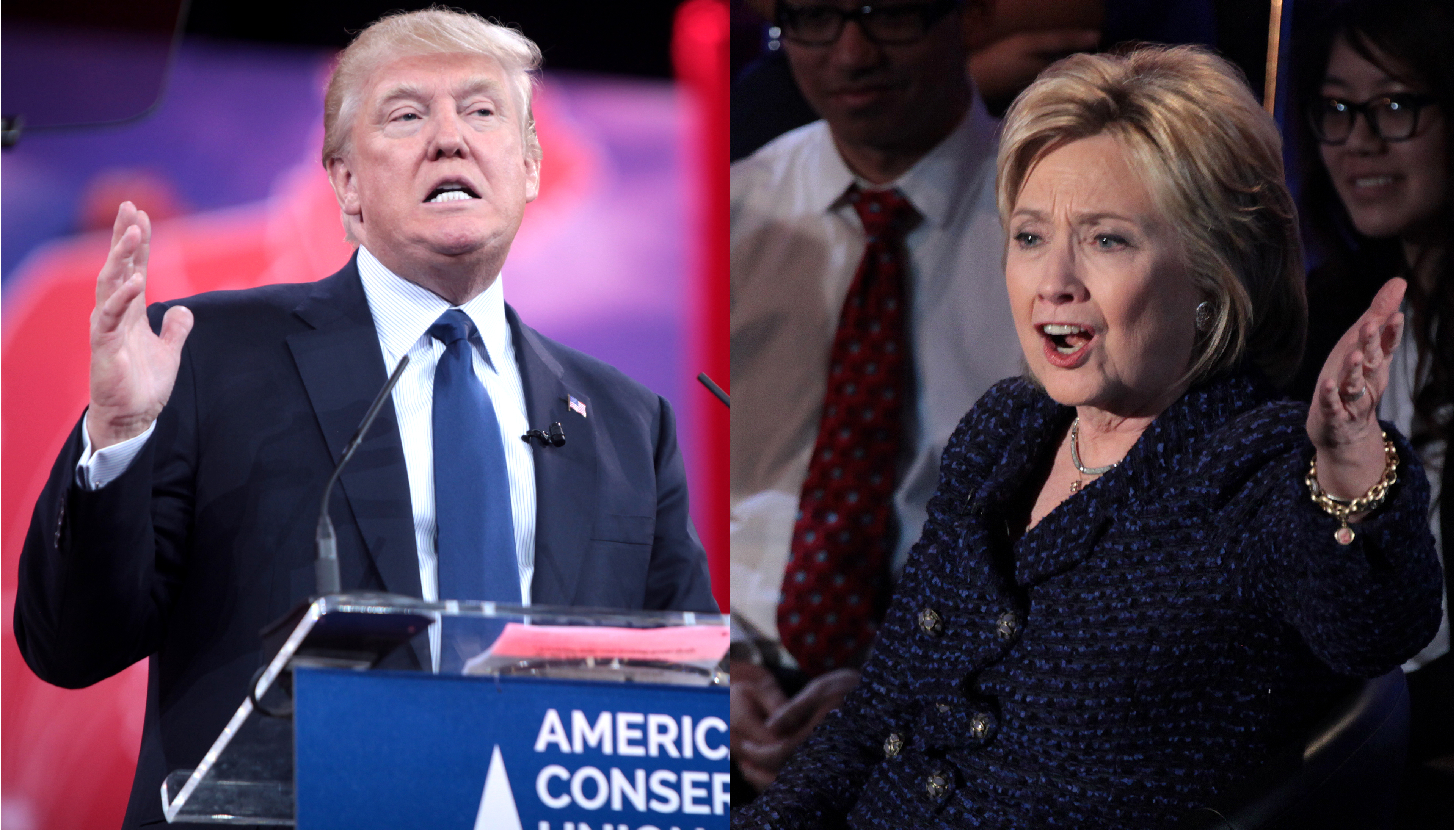
Trump and Clinton during presidential election 2016. (Krassotkin, derived from photos by Gage Skidmore, Wikimedia Commons, CC BY-SA 3.0)
The 2020 election was a little more interesting — and a little less certain. How about these comments from that year:
- Then-Director of National Intelligence Dan Coats: “I believe that Russia and China will both attempt to influence the election.” You believe? Will attempt? Either they did or they didn’t.
- F.B.I. Director Christopher Wray: “The Russians appear to be very active in trying to damage the Biden campaign.” Meaning what? What was the evidence? What did the Russians do to weaken the Biden campaign.
- Unnamed “intelligence officials:” “Operations would be intended to help President Trump, potentially by exacerbating disputes around the results, especially if the race is too close to call.” Would be intended? Meaning that they didn’t happen?
2020 Facebook Ads
What was eventually proven about Russian “interference” in the 2020 election was this:
Meta CEO Mark Zuckerberg testified before Congress, saying that the company had suspended an unknown number of accounts originating in Russia, but “posing as Americans” and making inflammatory comments about the election. When push came to shove, all that the vaunted Intelligence Community could prove was that organizations “connected to the Russian government” had spent $100,000 on Facebook ads.
Fully half of those ads were bought after the election was over. And the other half targeted Facebook users in states that were very red or very blue. There was no “influence” on the election at all.
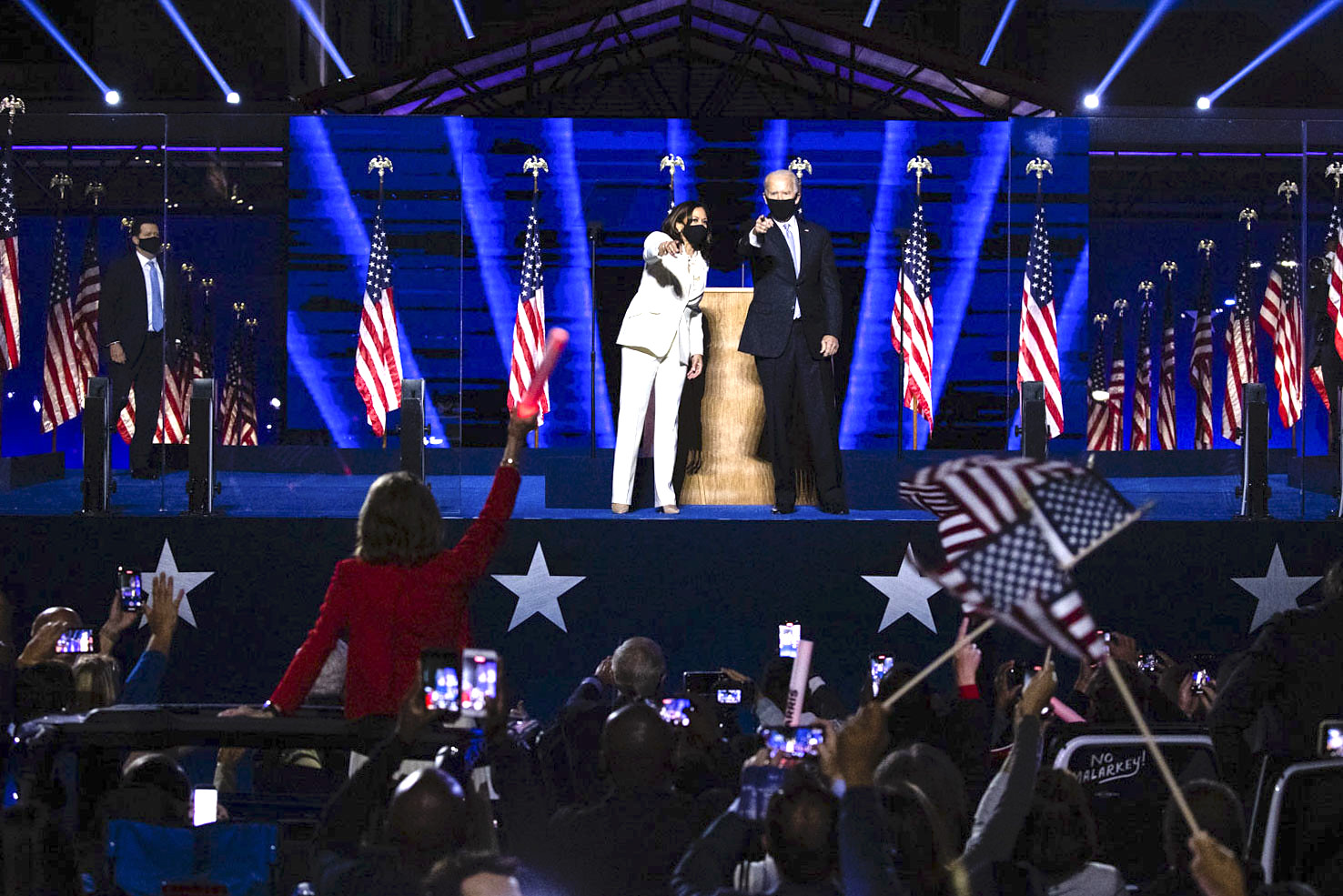
Kamala Harris and Biden celebrating his presidential victory, Wilmington, Delaware, Nov. 7, 2020. (David Lienemann, Biden For President, Flickr, CC BY-NC-SA 2.0)
That brings us to 2024. RT, the international Russian news network formerly known as Russia Today and that broadcasts in English, Spanish, and other global languages, was put out of business in the United States immediately after the start of the Ukraine war.
There is no RT propaganda in the United States. RT America simply no longer exists.
And Sputnik Radio, where I have a daily midday radio program, went from 35,000-38,000 daily downloads and tens of thousands of internet listeners, to 1,500-1,800 a day, having been thrown off YouTube, iTunes, Spreaker, Spotify, and literally every other platform besides Rumble. There’s almost no way for Russian networks to reach the American people.
The Justice Department last week alleged that the Russian government, through two overt employees, Kostiantyn Kalashnikov, 31, and Elena Afansyeva, 27, both from RT in Moscow, deployed “nearly $10 million to covertly finance and direct a Tennessee-based online content creation company to create and publish videos on multiple social media channels.”
The content was then meant also to be broadcast by far-right podcasters. The “operation” was never carried out.
The thing is, the people who listen to those podcasters and who follow the sites where these videos would have been shown are already voting for Donald Trump. Yes, it’s wrong for a foreign government to try to influence American elections, just like it’s wrong for the American government, including the C.I.A., to try to influence foreign elections, which it has done since 1948.
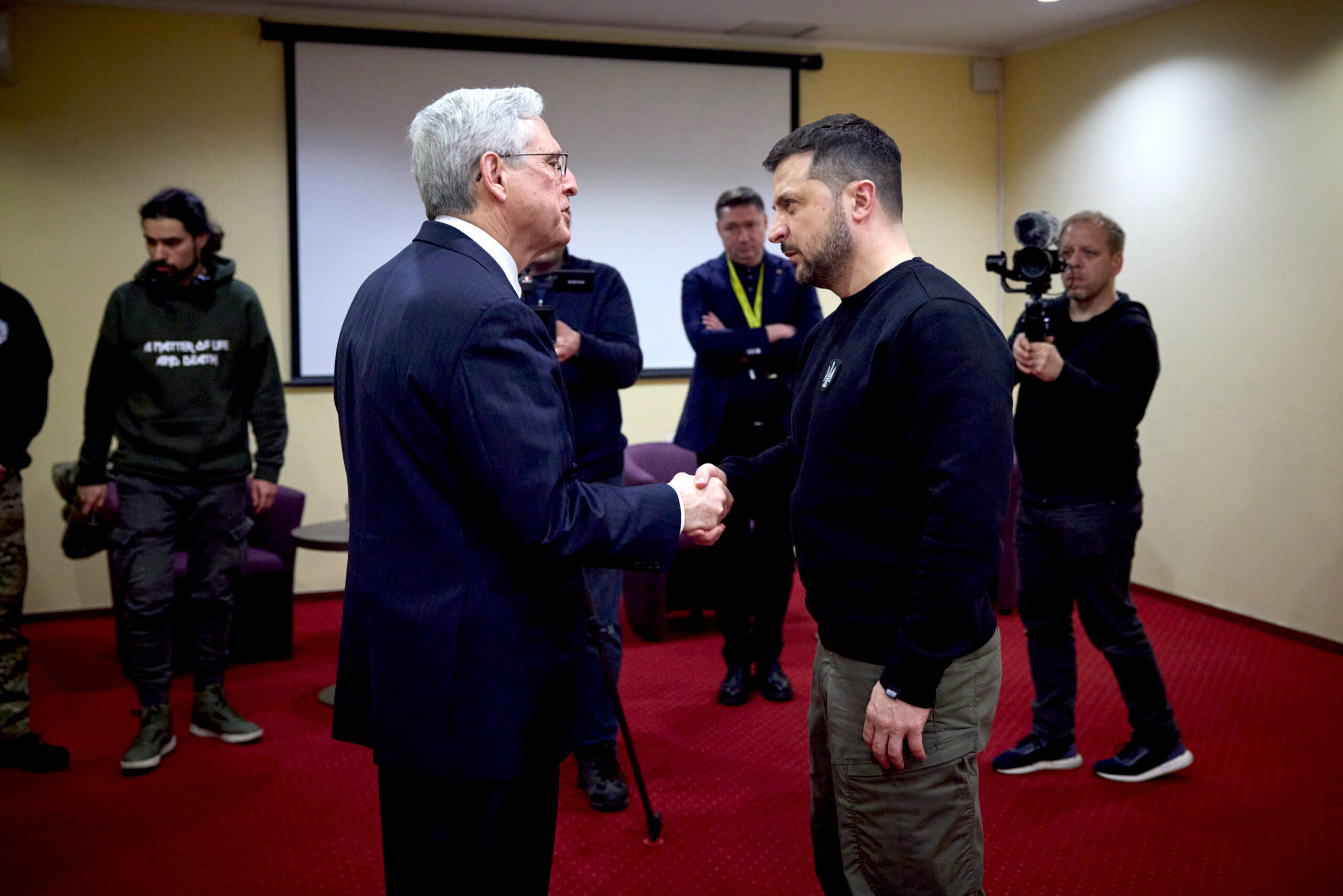
U.S. Attorney General Merrick Garland with Ukraine’s President Volodymyr Zelenskyy, in Lviv, March 3, 2023. (Wikimedia Commons, Public domain)
With that said, let’s keep things in perspective. First, it is certainly not wrong for a foreign news network to express an opinion as to whom it supports or opposes in a foreign election. That network, of course, can’t contribute to a U.S. political campaign, but there is no law against foreign media reporting fact or opinion about the election.
Second, Kalashnikov and Afansyeva will never be arrested. They’re in Russia. The indictment and big public announcement are just a part of Washington’s pre-election showmanship.
Besides, look at the charges.
First, the two are accused of having conspired to violate FARA. What that means in plain English is that they discussed not filling out an internet form at avaialble on the Justice Department website. Seriously. That’s literally what it means. The federal sentencing guidelines for violating this law call for zero-six months in jail and a $5,000 fine.
The two Russians are also charged with conspiring to launder money. They didn’t actually launder any money. They just talked about it. The federal sentencing guidelines for this offense call for a sentence of six-12 months in jail and a $1,000 fine.
For a serious case of election interference, if there had been actual interference, which is not even being alleged, I would have expected to see charges of espionage, at least. But there was none of that. Again, the accusation is that they conspired to not fill out an internet form.
I have never believed that the Russians have interfered or are interfering in our elections. There just isn’t any evidence of any widespread effort, even an ineffective one. As I said, interference is wrong, no matter who is doing it.
But going on every mainstream outlet and claiming a massive interference campaign is just as wrong. Rather than accuse each other of “threatening democracy,” maybe there’s a way to get past it.
I have long maintained that, even in a time of war, there are areas where the American and Russian governments can cooperate. Think counterterrorism, counterproliferation and counternarcotics.
But arresting or charging each other’s citizens and holding them until a prisoner exchange can be negotiated, as has been the case with the likes of Britney Griner, Viktor Butt, Paul Whelan, Evan Gershkovitz, and others, is not the way to go.
Neither is interfering with elections or accusing the other side of doing so without tangible evidence. In the end, it is the accusation itself that weakens our democracy.
And, frankly, it makes us look silly.
John Kiriakou is a former C.I.A. counterterrorism officer and a former senior investigator with the Senate Foreign Relations Committee. John became the sixth whistleblower indicted by the Obama administration under the Espionage Act—a law designed to punish spies. He served 23 months in prison as a result of his attempts to oppose the Bush administration’s torture program.


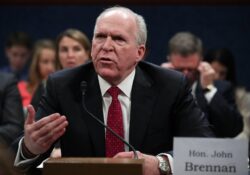
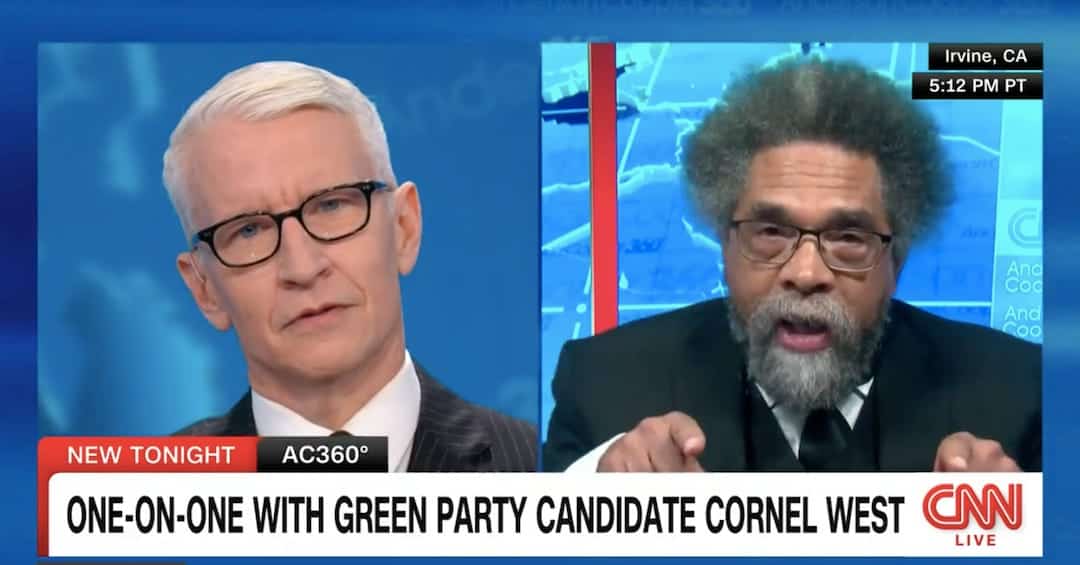
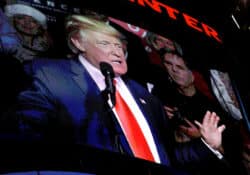
0 Comments